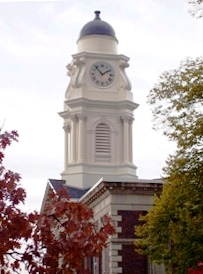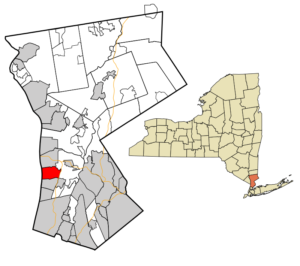
DIRTY DEEDS DONE DIRT CHEAP Irvington Village Clerk Brenda M. Jeselnik lied to our project and claimed that certain public documents did not exist, even though we had copies of emails that showed the public record exists.
No wonder the single family homeowners of Irvington complain that there is a lack of accountability and transparency in their village.
We have asked Irvington Village Clerk Brenda M. Jeselnik to legally certify that the public document doesn’t exist as allowed under New York States Freedom of Information Laws.

1. Freedom Of Information Compliance And Knowledge Ratings:
Under Review reports that she is paid $131,783 a year in salary, she falsely claims that the town has no records about how much village taxpayers pay for her benefits.
We have asked her to give us a legal certification in writing that village has no benefit or pension records for her position.
Her other FOI responses have been only partially complete.
2. Email Address For Filing FOI Requests
bjeselnik@irvingtonny.gov
3, Mailing Address For Filing FOI Requests
Town Clerk
85 Main Street
Irvington, New York 10533
4. Experience:
Brenda Jeselnik did not respond to a request for a short biographical information paragraph covering her education and experience.
On the internet we learned that Brenda Jeselnik formerly was employed as the deputy treasurer with Sleepy Hollow
Also on the internet one website reported the following about Brenda M. Jeselnik
FIND THE DATA: Brenda Jeselnik Salaries
2011 $108,924
2013 $$117,034
http://state-employees.findthedata.com/d/a/Brenda-Jeselnik
Brenda M Jeselnik is in her 60’s
Zodiac Sign
Pisces
Fort Pierce, FL
Pound Ridge, NY
Irvington, NY
5. From The Village Website:

Clerk-Treasurer
Responsibilities
- Handles all accounting including budget, finance, accounts payable, accounts receivable, tax collection, water & sewer billing, payroll and personnel.
- Issues parking permits, soliciting permits and handbill permits.
|
6. Media Reports / Related Pages

RIVER JOURNAL: Village Moves Forward on Fire Engine and Other Matters
What’s been happening since the Village elections?
Last week, River Journal sat down with Irvington Village Administrator Larry Schopfer for an update on the fire engine fiasco and other matters.
As you might recall, the Village of Irvington lost $322,201 after making a 75 percent deposit for a new fire engine with Elite Fire Apparatus, a Wisconsin-based company that has since gone bankrupt.
A Michigan-based company called Wolverine Fire Apparatus Company purchased Elite’s assets, but did not assume any of its liabilities, and said Irvington might suffer a complete loss of the money if it did not purchase a performance bond, which it did not.
Since then, KRPJ (Korn Rosenbaum LLP) did an audit of the entire transaction and provided recommendations for avoiding similar problems in the future. Schopfer said that Village officials are currently discussing ways to revise purchasing procedures based on these recommendations, which include:
• Due diligence in determining the financial stability of major vendors.
• Evaluation of whether a purchase needs a performance bond.
• All contracts reviewed by the Village attorney.
• Implement internal audit function of all disbursements.
• Require second signature on checks above certain amount.
• Originating department head should approve all purchase orders.
• All payment terms to be matched by stipulated terms in the bidding process.
• Experts with appropriate technical knowledge to monitor manufacturing progress.
Meanwhile, the Village is involved in two lawsuits that may help it recover some of the lost funds. The Village has filed a claim with Elite’s insurance company.
“I give that a low probability of yielding any results,” Schopfer said.
In addition, three residents —Barry Cunningham, Constance Kehoe and Mark Gilliland — filed notice of claim against the Village alleging that the lost money wasn’t authorized to be spent. This claim has been submitted to St. Paul Travelers Public Officials Insurance. Schopfer said this claim might help recover some of the lost funds as well.
Meanwhile, at a recent Board of Trustees meeting, Brenda M. Jeselnik was appointed as the new clerk/treasurer. Jeselnik is currently the deputy treasurer with Sleepy Hollow and will start in Irvington on June 2. She replaces Ed Ritter who has become the Town Comptroller for Bedford…..
http://www.riverjournalonline.com/villages/irvington/835-Village-Moves-Forward-on-Fire-Engine-and-Other-Matters.html
PATCH: No Contests in Irvington’s First November Village Election
The Village of Irvington has officially switched over its local elections to November to coincide with the general election.
Up for grabs this year are two village trustee seats and the mayoral post.
According to Village Clerk Brenda M. Jeselnik, the November 5 election will be uncontested.
Republican Brian Smith is seeking a second two-year term as mayor.
Democrat Connie Kehoe is seeking a third term as trustee.
Kristen Woll, running for the first time, is looking to fill the second open trustee position, which will be vacated by current Trustee Ken Bernstein (who is not seeking re-election)…..
Please Read More Here:
http://patch.com/new-york/rivertowns/no-contests-in-irvingtons-first-november-village-election
NEW YORK TIMES: Irvington, N.Y., Nature, Near the Upper West Side
…The village manages 125 parking spaces at Ardsley-on-Hudson; permit holders pay $511 a year, and there is no waiting list, said Brenda Jeselnik, the village clerk…..
Please Read More Here:
http://www.nytimes.com/2013/10/06/realestate/irvington-ny-nature-near-the-upper-west-side.html
7. Notes
This Ratings Page Has Been Updated With Additional Information
About Irvington, New York

Irvington, sometimes known as Irvington-on-Hudson, is an affluent suburban village in the town of Greenburgh in Westchester County, New York, United States.
It is located on the eastern bank of the Hudson River, 20 miles (32 km) north of midtown Manhattan in New York City, and is served by a station stop on the Metro-North Hudson Line. To the north of Irvington is the village of Tarrytown, to the south the village of Dobbs Ferry, and to the east unincorporated parts of Greenburgh, including East Irvington. Irvington includes within its boundaries the community of Ardsley-on-Hudson, which has its own ZIP code and Metro-North station, but which should not be confused with the nearby village of Ardsley, New York.
The population of Irvington at the 2010 census was 6,420. Because many of Irvington’s residents – expecially those in the upper income brackets – live in Irvington and work in New York City, the village has a reputation as a “commuter town” or a “bedroom community”.
The village’s Main Street area has been designated an historic district by New York State and, as of 2013, is under consideration for addition to the National Register of Historic Places. In 2010, Westchester Magazine ranked Irvington as the “Best Place to Live in Westchester.
Before the area where Irvington is now located was settled by Europeans, it was inhabited by the Wickquasgeck Indians, a band of the Wappingers, related to the Lenape (Delaware) tribes which dominated lower New York state and New Jersey. The Wickquasgeck still lived in the area as late as 1775.
After the Dutch came to the area, the land was part of the Bisightick tract of the Van der Donck grant purchased by Frederick Philipse in 1682, after the British had taken over the area in 1664, and most of the settlers in the 1700s were artisans. In 1785, the state of New York confiscated the Phillipse’s land from his grandson, Frederick Philipse III, after he sided with the British in the American Revolution, and sold it to local patriot farmers who had been tenants of the Phillipse family. This is presumably how part of it came to be the farm of William Dutcher. Dutcher sold half of his farm to Justus Dearman in 1817, who then sold it to Gustavo F. Sacchi in 1848 for $26,000. Saachi sold the parcel to John Jay – the grandson of the American Founding Father by the same name– that same year, and Jay laid it out as a village which he called “Dearman”, after Justus Dearman, and sold lots at auction in New York City starting on April 25, 1850.
The organization of the streets into a right-angled grid pattern was criticized by Andrew Jackson Downing, who was at the time the foremost expert on landscape design. Downing condemned the use of the street grid outside of cities and saw the hilly and heavily wooded site of Dearman as particularly suited to his own theories, which called for curvilinear roads and irregular lots which followed the contours of the land. With the frequent steamboat, stagecoach, and train transportation available, he felt that Dearman could have been an ideal suburb, instead of “mere rows of houses upon streets crossing each other at right angles and bordered with shade trees”.
The side streets off the village’s Main Street – or “Main Avenue”, as an 1868 map has it – were originally designated “A”, “B”, “C”, and so forth, but are today named after many of the area’s early settlers, such as Barent and William Dutcher, Captain John Buckhout (who lived to 103) and Wolfert Ecker (or “Acker”)….
Please read more here:
https://en.wikipedia.org/wiki/Irvington,_New_York





